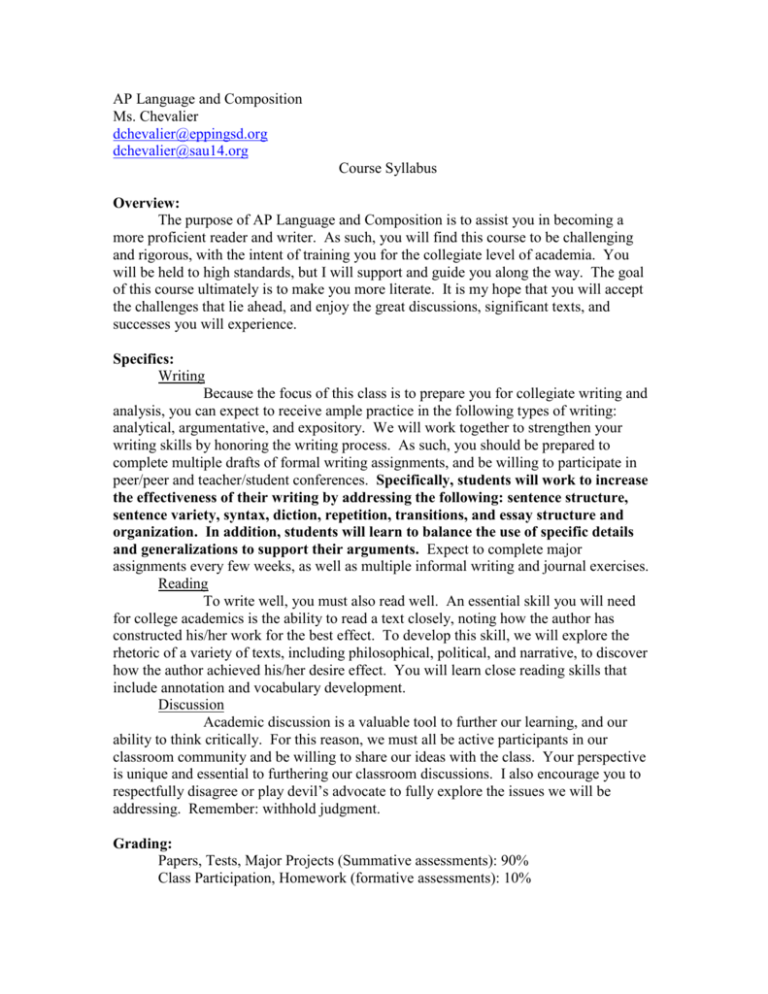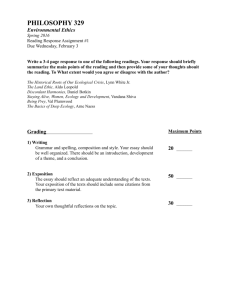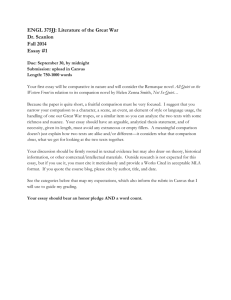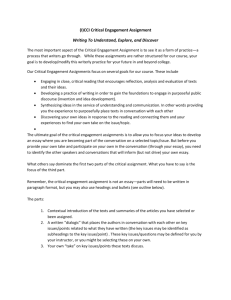
AP Language and Composition
Ms. Chevalier
dchevalier@eppingsd.org
dchevalier@sau14.org
Course Syllabus
Overview:
The purpose of AP Language and Composition is to assist you in becoming a
more proficient reader and writer. As such, you will find this course to be challenging
and rigorous, with the intent of training you for the collegiate level of academia. You
will be held to high standards, but I will support and guide you along the way. The goal
of this course ultimately is to make you more literate. It is my hope that you will accept
the challenges that lie ahead, and enjoy the great discussions, significant texts, and
successes you will experience.
Specifics:
Writing
Because the focus of this class is to prepare you for collegiate writing and
analysis, you can expect to receive ample practice in the following types of writing:
analytical, argumentative, and expository. We will work together to strengthen your
writing skills by honoring the writing process. As such, you should be prepared to
complete multiple drafts of formal writing assignments, and be willing to participate in
peer/peer and teacher/student conferences. Specifically, students will work to increase
the effectiveness of their writing by addressing the following: sentence structure,
sentence variety, syntax, diction, repetition, transitions, and essay structure and
organization. In addition, students will learn to balance the use of specific details
and generalizations to support their arguments. Expect to complete major
assignments every few weeks, as well as multiple informal writing and journal exercises.
Reading
To write well, you must also read well. An essential skill you will need
for college academics is the ability to read a text closely, noting how the author has
constructed his/her work for the best effect. To develop this skill, we will explore the
rhetoric of a variety of texts, including philosophical, political, and narrative, to discover
how the author achieved his/her desire effect. You will learn close reading skills that
include annotation and vocabulary development.
Discussion
Academic discussion is a valuable tool to further our learning, and our
ability to think critically. For this reason, we must all be active participants in our
classroom community and be willing to share our ideas with the class. Your perspective
is unique and essential to furthering our classroom discussions. I also encourage you to
respectfully disagree or play devil’s advocate to fully explore the issues we will be
addressing. Remember: withhold judgment.
Grading:
Papers, Tests, Major Projects (Summative assessments): 90%
Class Participation, Homework (formative assessments): 10%
Proposed Unit Schedule:
Unit One: Memoir:
Proposed texts:
Angela's Ashes – Frank McCourt (summer reading)
An American Childhood - Annie Dillard (summer reading)
“The Stranger in the Photo is Me” -- Donald Murray
“Mother Tongue” -- Amy Tan
“Memoirs of a Dead Man Walking” -- Sister Helen Prejean
“Frank Sinatra's Gum” -- Kelly Simon
“Killing Chickens” -- Meredith Hall
“Mein Kampf (My Struggle)” -- Art Spiegelman (Graphic Essay)
“Remembering My Childhood on the Continent of Africa”-- David Sedaris
Formal Papers:
Photo Memoir
Students should choose a photograph of themselves as a young
child and write a memoir using the photograph as their focus.
Compare and Contrast
After a close reading of Angela's Ashes and viewing the film,
students will write an essay in which they identify the choices
made by the director of the film interpretation of “Angela's
Ashes,” and compare and contrast those with the original memoir.
Unit Two: Health:
Proposed texts:
“That Lean and Hungry Look” -- Suzanne Britt
“Why McDonald's Fries Taste So Good” -- Eric Schlosser
“Disability in the Media” -- Doug Roberts
“Pain” -- Diane Ackerman
“Code Blue: The Process” -- Jasmine Innerarity
“Code Blue: The Story” -- Abraham Verghese
“The Technology of Medicine” -- Lewis Thomas
“Disability” -- Nancy Mairs
“Why the Able-Bodied Still Don't Get It” -- Andre Dubus
“Should I Have Been Killed at Birth?” --or-- “Unspeakable Conversations”
-- Harriet McBryde Johnson
“First Principles and the 'Frist Principles'” -- Richard Doerflinger
“Stem Cell Research: It's About Life and Death, Not Politics”
-- Peggy Prichard Ross
Formal Papers:
Researched Argumentative Essay
Should we allow for stem cell research? Students should research
the issue of stem cell research, using at least 5 additional source
texts from credible sources to review the myriad different views on
this issue. In an essay, students will assert their position, and
using rhetorical strategies, argue their position.
Synthesis Essay
After a close reading of “Disability,” “Why the Able Bodied Still
Don't Get It,” and “Should I Have Been Killed at Birth?”,
students will explore how these three texts relate to one another.
In addition to examining how the writers use rhetoric to achieve
their purposes, students should also identify their viewpoint on
disability and argue it.
Unit Three: Education:
Proposed texts:
“Who Owns Intelligence?” -- Howard Gardner
“How Teachers Make Children Hate Reading” -- John Holt
“A Talk to Teachers” -- James Baldwin
“How Computers Change the Way We Think” -- Sherry Turkle
“Human Cost of an Illiterate Society” -- Jonathan Kozol
“How Reading Changed My Life” -- Anna Quindlen
“Shakespeare in the Bush” -- Laura Bohannan
“Campus Racism 101” -- Nikki Giovanni
“Academic Selves” -- Mary Pipher
“Gender in the Classroom” -- Deborah Tannen
“Best in Class” -- Margaret Talbot
“A Model for High School” -- David S. Broder
“The Case Against College” -- Linda Lee
“The Value of a College Degree” -- Kathleen Porter
Visual texts:
“Reading at Risk” -- National Endowment for the Arts
“Spirit of Education” -- Norman Rockwell
Formal Papers:
Argumentative Essay:
Students will imitate the style of James Baldwin and write their
own “Talk to Teachers.”
Synthesis Essay:
After completing the reading in this unit, students will identify 3
problems faced by high schools today, and propose solutions for
those problems. Students must site at least 3 of the texts from this
unit, including quotations.
Unit Four: The Face of America (And an Introduction to Rhetoric)
A: Foundations of Government
Proposed Texts:
“Declaration of Independence” – Thomas Jefferson
“Gettysburg Address” – Abraham Lincoln
Common Sense - Thomas Paine
Formal paper: Researched Argumentative Essay in the vain of Thomas Paine.
After a close reading of “Common Sense,” students will identify an issue
about which they feel strongly. They will then research all points of view
and angles of this issue to complete an argumentative essay. This
assignment will focus on developing students' research skills, identifying
appropriate quality sources, citing of sources correctly based on the MLA
standard, and writing multiple drafts to allow for student/teacher and
peer/peer conferences. Students will work on incorporating sentence
variety, transitions, and other rhetorical strategies into their writing.
Students will focus on creating a balance between the use of specific
details and generalizations.
B: Women's Suffrage Movement
Proposed texts:
“Declaration of Sentiments” -- Elizabeth Cady Stanton
“Disappointment is the Lot of Women” -- Lucy Stone
“Letters” -- John and Abigail Adams
“A Vindication of the Rights of Women” -- Mary Wollstonecraft
“Ain't I a Woman?” - Soujourner Truth
Formal Papers:
Compare/Contrast “Declaration of Sentiments” with “Declaration of
Independence”
Students will compare both Declarations, identifying similar
rhetorical techniques used by both authors, and the effects these
techniques elicit in their audience. Students will focus on
sentence variety and structure.
C: Civil Rights
Proposed texts:
“A Modest Proposal” -- Jonathan Swift
“Letter from Birmingham Jail” – Martin Luther King, Jr.
“The Singer Solution to World Poverty” -- Peter Singer
“Civil Disobedience” -- Henry David Thoreau
Selected Chapters from Everything's an Argument with Readings
In this unit, students will be introduced to the fundamentals of rhetorical analysis,
including the appeals, audience, speaker, subject, purpose, and context. In addition,
students will be explore examples of various rhetorical techniques, including, but not
limited to, repetition, listing, tricolon, allusions, diction, syntax, comparison, imagery,
etc.
Formal paper: Rhetorical Analysis of “Letter from Birmingham Jail.”
After a close reading of “Letter from Birmingham Jail,” students will
explore the rhetorical techniques used by King in this letter.
Unit Five: Gender Issues:
Proposed texts:
Cluster: Women's Issues
“On Discovery” -- Maxine Hong Kingston
“I Want a Wife” -- Judy Brady
“Women's Brains” -- Stephen Jay Gould
“Professions for Women” -- Virginia Woolf
“There is No Unmarked Woman” -- Tannen
“Barbie Doll” (poetry) – Marge Piercy
Cluster: Muslim women:
“Shrouded in Contradiction” -- Gelareh Asayesh
“Mirror, Mirror On the Wall, Who's the Fairest of Them All?” -- Sumbul Khan
Visual Text: “The Veil” -- Marjane Satrapi
“Uncle Sam & Aunt Samantha” -- Anna Quindlen
Cluster: Men's Issues
“Women and the Future of Fatherhood” -- Barbara DeFoe Whitehead
“Guys vs. Men” -- Dave Barry
“How Boys Become Men” -- Jon Katz
“Being a Man” -- Paul Theroux
“Why Men Don't Last: Self Destruction as a Way of Life” -- Natalie Angier
Cluster: Homosexuality
“Virtually Normal” -- Andrew Sullivan
“Family Values” -- Richard Rodriguez
A variety of image-based texts (advertisements, photographs, artwork, etc.) including
“New and Newer Versions of Scripture” by Bill Broadway.
Formal Papers:
Gender Journal Scrapbook
Students will collect samples of media portrayals of women
and men, including both positive and negative slants on gender
stereotypes. Samples should cover an array of materials:
advertisements, articles, comics, websites, photos, etc. Students
will comment on their samples, providing insight into their
deconstruction of the article, and their thoughts and feelings about
the article. After completion, students will present these to the
class.
Argument Essay
After completing their Gender Journals, students will then write
an essay in which they argue what the stereotypes presented in
the images say about our cultural values and beliefs regarding
gender roles. Students will focus on incorporating a balance
between generalizations and more specific details.
Rhetorical Analysis
Students will choose an image based text, either from this unit
or one they identify independently, and write a rhetorical analysis
of that text. They will demonstrate their understanding of
rhetorical techniques used in image based texts.
Narrative
Students will write about an incident in which they personally
experienced a gender stereotype. The assignment will require
that they identify and address that event in a descriptive narrative.
Unit Eight: War and Peace:
Proposed texts:
“The Roots of War” -- Barbara Ehrenreich
“Thoughts in the Presence of Fear” -- Wendell Berry
“Citizens of a Troubled World” -- Jimmy Carter
“Dulce et Decorum Est” (poetry) – Wilfred Owen
“Regarding the Torture of Others” -- Susan Sontag
“Democracy for All?” -- James Q. Wilson
Excerpts from Dear America: Letters Home from Vietnam – Bernard Edelman
Visual text: “Why We Fight”--Documentary by Eugene Jarecki
Visual text: “War and Peace Images, Impressions, Interpretations”
-- Lynn Z. Bloom
Visual text: Public Service Announcement by the Physicians Against Landmines
Formal Papers:
Researched Argumentative Essay
Students will research current opinions, arguments, and facts
related to torture. After compiling at least 5 outside sources for
articles, essays, visual texts, etc., students should write their own
persuasive argument answering the question of the use of torture.
Rhetorical Analysis
Students will explore the use of rhetoric in the film “Why We
Fight,” siting the techniques used by the director, and to what
effect they were used.
Synthesis
Considering the texts we explored during this unit, students should
answer the following question: To what extent, if at all, should the
United States be involved in Iraq? Students should site at least
3 different sources in their essay, as well as one additional source
that they locate on their own.
Primary Texts:
Lunsford, Andrea A., John J. Ruszkiewicz, and Keith Walters. Everything's An
Argument with Readings, 4th Edition.
Trimmer, Joseph F. and Maxine Hairston. The Riverside Reader, 8th Edition. New York:
Houghton Mifflin Company, 2005.
Additional Resources:
Bloom, Lynn Z. The Essay Connection, 8th Edition. New York: Houghton Mifflin
Company, 2007.
Cooley, Thomas. The Norton Sampler, Sixth Edition. New York: W. W. Norton &
Company, Inc., 2003.
Kennedy, X. J., Dorothy M. Kennedy, and Jane E. Aaron. The Bedford Reader, Ninth
Edition. Boston: Bedford/St. Martin's, 2006.
McCourt, Frank. Angela's Ashes. New York: Scribner, 1996.
Miller, George. The Prentice Hall Reader, Eighth Edition. New Jersey: Pearson Prentice
Hall, 2007.
Miller, Robert K. The Informed Argument, Seventh Edition. Boston: Thomas
Wadsworth, 2007.
Peterson, Linda H., and John C. Brereton. The Norton Reader, Shorter Eleventh Edition.
New York: W. W. Norton & Company, Inc., 2004.
Shea, Renee H., Lawrence Scanlon, and Robin Dissin Aufses. The Language of
Composition. Boston: Bedford/St. Martin's, 2008.
Why We Fight. Dir. Eugene Jarecki. Perf. John McCain, Susan Eisenhower, Richard
Perle, Gore Vidal, Wilton Sekzer. DVD. Sony Pictures, 2006.
Updated: July 2015








